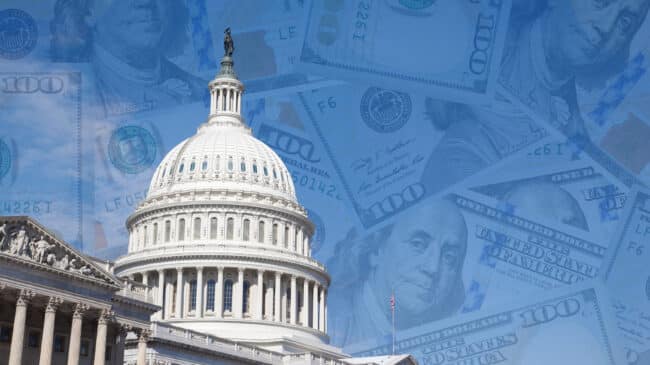With President Joe Biden looking to pass a major infrastructure bill and other policy priorities, the growing question is how he will pay for them. While some Republican senators have signaled some interest in cutting bipartisan deals, both sides should be focusing on budget cuts and reprioritizing existing revenues. They must avoid tax increases that could undercut the economic recovery as the number of vaccinated Americans grows and we hopefully emerge from the COVID-19 pandemic.
President Biden has called for upping the corporate tax rate from 21 percent to 28 percent. While that’s still lower than the country’s corporate tax rate prior to the 2017 tax cut bill, which was then 35 percent, it’s a bad idea. At 28 percent, the federal corporate tax rate, combined with state corporate taxes, would be over 32 percent, putting the U.S. back to having the highest corporate tax among the highly-developed OECD, Organization for Economic Co-operation and Development, nations. For example, Canada’s corporate tax rate is 15 percent and Mexico’s is 30 percent. One outcome of Biden’s proposed tax hike would be more corporations looking to move out of the U.S. to lower-tax countries.
Decades of research also show higher corporate tax rates get passed on to workers, who end up paying the majority of the costs in the form of lower pay and benefits. The Tax Foundation estimates Biden’s corporate tax increase would eliminate 159,000 jobs, reduce long-run economic output by 0.8 percent and wages by 0.7 percent, with the bottom 20 percent of earners on average seeing a 1.45 percent drop in after-tax income in the long term.
Biden also wants to raise taxes on the wealthiest Americans. “Anybody making more than $400,000 will see a small to a significant tax increase,” Biden recently said to ABC.
Raising taxes on the wealthy consistently polls well with voters of both major political parties, but it’s a bad policy that doesn’t work as intended. An analysis in the Quarterly Journal of Economics of decades of data shows that tax increases on individual incomes reduce average incomes and economic activity, but the effect is the fastest and largest when taxing the top one percent. The so-called 1990 luxury tax, for example, killed so many jobs that the federal government actually lost revenue because of it. That is because the rich do not sit on mountains of gold in their vaults, as some might imagine. Most of their money is either invested or spent so raising taxes on the rich lowers consumption and all the jobs that creates, and lowers investment and all the jobs that creates. Hence, the top one percent pay considerably more in income taxes than the bottom 90 percent of taxpayers combined.
The country is expecting significant economic growth this year as more Americans are vaccinated and able to travel to visit loved ones, go on vacations, eat in restaurants and attend things like sporting events. Tax increases would undercut this growth by taking money that would be invested in expanding existing businesses or opening new ones.
President Biden and Republicans need to show some seriousness about dealing with the nation’s debt and deficits. In the debate leading up to the recent $1.9 trillion spending bill — which came after President Trump’s own $2.2 trillion stimulus bill and four years running up debt and deficits — the GOP could not credibly claim it cared about debt and deficits. Republicans and conservatives “ditched any semblance of fiscal restraint during the last four years of economic expansion (i.e., precisely when it’s easiest to cut spending),” Scott Lincicome recently noted in his newsletter for The Dispatch.
Spending cuts are needed and the country’s massive defense spending, over $700 billion a year, is ripe for cutting. A group of House Democrats is urging Biden to trim the Pentagon’s budget. Unfortunately, Republicans want more, not less, spending. “The problem with decreased or flat defense budgets is that our adversaries aren’t looking at cutting defense spending. It’s the opposite,” Rep. Mike Rogers, the leading Republican on the House Armed Services Committee, claimed.
As a military veteran I’d argue he is wrong because our current military is more than capable of defending our nation and, if we stopped our absurd and broken attempts at nation-building overseas, our defense budget is more than adequate already.
If Republicans aren’t going to support ending our forever wars and reducing defense spending, they should at least try to ensure that any big infrastructure and spending bills embrace the user-pays principle and utilize public-private partnerships. Raising the federal gas tax is counterproductive — as vehicles become more fuel-efficient — and politically unpopular, but private companies and private equity firms are ready to invest billions in major infrastructure projects. From water and sewer systems to roads and bridges, infrastructure can be built via public-private partnerships using private capital and charging user direct fees to pay for it.
Users don’t pay any more than they would’ve otherwise, the projects get built faster, private investors take most of the financial risks of losses if something goes wrong with the project, such as delays and cost overruns, and the companies can make a profit if they deliver the project efficiently.
Infrastructure projects that are paid for by users, not by federal taxes, can be a big boost to the economy. Combining this approach with some smart realignment of other federal spending would allow President Biden to achieve his policy goals without the harmful tax cuts he is considering and the consequent blow to the economy and to lower-income workers.
A version of this column previously appeared in the Daily Caller.

